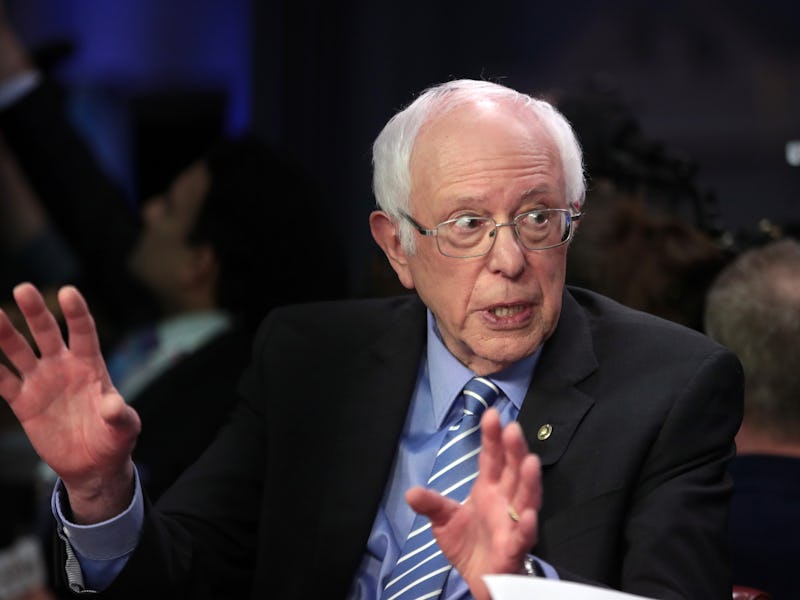Sanders' Medicare-for-All study: What does it actually show?
At the South Carolina Democratic debate, Bernie Sanders called out a study backing up his Medicare-for-All plan. Here are the facts.

At the Democratic presidential debate in South Carolina, Senator Bernie Sanders cited a Lancet study he says backs up his claim that a Medicare-for-All-style healthcare system would not only help save lives, but also save mega bucks.
But does the study prove Sanders’ big talking point? Inverse has the scoop.
The analysis, conducted by researchers at Yale University, the University of Florida and the University of Maryland, argues that replacing premiums, deductibles, co-payments, and out-of-pocket costs with a progressive tax system would save billions of dollars – and tens of thousands of lives.
The study was published February 15, 2020 in the journal The Lancet.
"Our study is actually conservative because it doesn't factor in the lives saved among underinsured Americans — which includes anyone who nominally has insurance but has postponed or foregone care because they couldn't afford the copays and deductibles," study author Alison Galvani said in an interview at the time the study published with Newsweek.
Galvani served as an unpaid informal advisor for Sanders’ Senate office for his 2019 Medicare-for-All Act. None of the other authors of the paper had any outside or competing interests to disclose.
How much could Medicare for All save?
Medicare-for-All, also referred to as universal health care, is routinely dismissed as being too expensive. But the new research proposes that is not the case — it estimates that a single-payer healthcare system, similar to Sanders' Medicare-for-All plan, results in a 13 percent decrease in spending on healthcare in the US — which works out at about $450 billion annually.
In fact, just eliminating patient billing alone could save $35 billion, the study suggests.
For the average American family, that trickles down to about $2,400 in potential annual savings. Lower-income households would experience the greatest relief, the study suggests.
This table shows how out-of-pocket spending may change under a single-payer healthcare system.
At the same time, such a system may prevent 68,500 deaths each year, the study estimates. It may also save 1.73 million life-years annually — that means years of life gained as a result of receiving healthcare.
"It will save working-class families thousands of dollars and it will prevent tens of thousands of Americans from dying each year," Sanders said during the debate.
Murky waters
This is not the first, nor will it be the last, study of its kind to look at the cost of single-payer healthcare systems. And there is a large body of evidence that contradicts Sanders’, and the study’s, claims. For example, a 2019 study from the Urban Institute suggests that single-payer medical plans would actually cost more than current healthcare options — to the tune of $720 billion.
“Federal government spending would increase by $2.8 trillion in 2020, or $34.0 trillion over 10 years,” the report says.
The number of uninsured Americans has risen for the first time in a decade, with the figure estimated to be over 27 million in 2018. Despite this, current health-care expenditure in the US is higher per capita than in any other developed country.
Interestingly, this study's authors also account for a scenario in which the Affordable Care Act is repealed — doing that would lead to an additional 38.500 lives lost annually, they say.
Ultimately, the study's authors conclude that medical professionals and policy makers have a "moral imperative" to provide people with the healthcare they need.
"The medical community should seize this opportunity to promote wellbeing, enhance prosperity, and establish a more equitable health-care system for all Americans," they say.
Abstract: Although health care expenditure per capita is higher in the USA than in any other country, more than 37 million Americans do not have health insurance, and 41 million more have inadequate access to care. Efforts are ongoing to repeal the Affordable Care Act which would exacerbate health-care inequities. By contrast, a universal system, such as that proposed in the Medicare for All Act, has the potential to transform the availability and efficiency of American health-care services. Taking into account both the costs of coverage expansion and the savings that would be achieved through the Medicare for All Act, we calculate that a single-payer, universal health-care system is likely to lead to a 13% savings in national health-care expenditure, equivalent to more than US$450 billion annually (based on the value of the US$ in 2017). The entire system could be funded with less financial outlay than is incurred by employers and households paying for health-care premiums combined with existing government allocations. This shift to single-payer health care would provide the greatest relief to lower-income households. Furthermore, we estimate that ensuring health-care access for all Americans would save more than 68 000 lives and 1·73 million life-years every year compared with the status quo.